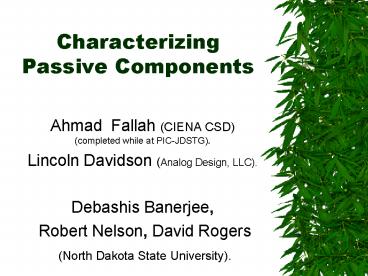Characterizing Passive Components - PowerPoint PPT Presentation
1 / 20
Title:
Characterizing Passive Components
Description:
Characterizing Passive Components. Ahmad Fallah (CIENA CSD) (completed while at PIC-JDSTG) ... Use common standards and available transmission lines to ... – PowerPoint PPT presentation
Number of Views:30
Avg rating:3.0/5.0
Title: Characterizing Passive Components
1
Characterizing Passive Components
- Ahmad Fallah (CIENA CSD) (completed while at
PIC-JDSTG). - Lincoln Davidson (Analog Design, LLC).
- Debashis Banerjee,
- Robert Nelson, David Rogers
- (North Dakota State University).
2
Outline
- Test Fixture and Setup
- Test Uncertainties
- Error Correction Methods
- TRL/TRM Method
- The Measurements
- Setup Verification
- S-to-Z Conversions
- The Really-Short Line
- Notes on Calculations for C and L Values
- Summary
- Future Work
3
Test Fixture and Setup
- The 50-Ohm line Test Jig
4
Test Uncertainties
- Shift in the measurement plane
- Connector and line mismatches
- Length of the test fixture
5
Error Correction Methods
- Mathematical method
- ABCDD ABCD-1 ABCD m ABCD
- TRL Method
- Use common standards and available transmission
lines to calibrate out the unwanted effects.
6
TRL/TRM Method
- Thru (a short piece of transmission line),
- Reflection (an open),
- Isolation,
- Match
7
Measurements
- For the 50-ohm matched test fixture, it should be
verified that the cursor remains at the center of
the Smith chart (e.g., VSWR 1) - A Shorter line (fixture was used) to avoid these
problems specially at Higher frequencies.
8
Setup VerificationS21 plot for the 2-cm test
fixture from 100 MHz to 1000 MHz
9
S-to-Z Conversions
- For a Shunt Element
- ZSH (Z0S21)/(2(1-S21)) R j (?L
1/?C) - For a Series Element
- Zs 2Z0(1-S21)/S21
- R Real Z
- ?L 1/?C Im Z
10
The Really-Short Line
- A very-short piece of the line was cut of a test
fixture, such that the SMA connectors butted
against each other. - Not much more improvements in the accuracy of
the measurements was achieved. - The Point
- It is easier to solder components on a larger
test fixture.
11
100-nF capacitor parametersApprox. Resonance
Freq.21.1 MHz, C138.69 nF, L2.02 nH
12
10-nF capacitor parameters Note there is a typo
in the paper
13
2.2-nF capacitor parametersApprox. Resonance
Freq.134.65 MHz, C2.94 nF, L1.15 nH
14
Notes on Calculations for C and L Values
- To calculate the values of C and L, equation 5
was solved at the first two data points. - The measured results agree with the published
(nominal) value for the capacitance value for
some of the components, but not for all
measurements. - calculations result in different values if
performed at different frequencies. - to obtain improved results, better numerical
techniques need to be employed
15
470-pF capacitor parametersApprox. Res.
Freq.334.56 MHz, C0.50 nF, L6.50 nH
16
Ferrite Bead Parametersat f 100 MHzZ624.565
ohms, R58.6578 ohms, X621.804 ohms
17
Ferrite-Capacitor ComboModeled as a shunt
element
18
Series impedance parameters for the L-C filter
19
Summary
- It is possible to use a simple and inexpensive
device for characterizing passives. - Calibrate out the uncertainties using the TRL/TLM
method. - Method is most effective in determining the dip
vs. frequency.
20
Future Work
- Better numerical techniques need to be employed.
- Work in conjunction with our other work. I.e.,
verify the results of the components measurement
on live boards. - Improve the frequency and impedance value
accuracy and resolution by acquiring a higher
number of data points. - Include measurements taken with an expensive
measurement system. - Compare components of different manufacturers to
each other.































